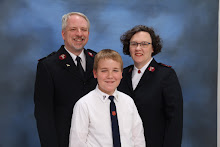Why An Army? Urban Army
The following is an article from http://www.salvosmedia.com/pipeline/2006/pipeline_08aug2006.pdf
Thanks, as usual, to Captain Stephen Court at www.armybarmy.com/blog
Jeff Lucas is the funniest preacher I have ever heard. But it is one of his serious lines from a recent conference that haunts me: “Christians looking for a better class of sinner.”
Looking back over my years of being a soldier in The Salvation Army, I get the impression that for many of those years I have been doing just that. I have said to myself too many times: “After all, the comfortable middle class need saving as well.”
It’s much easier for me to hang out with people like me. The only problem is that it appears the middle class haven’t returned the favour. There is just too much about Salvation Army life that is irrelevant to most comfortable middle class pagans. So they have admired us, donated to us but refused to join us in significant numbers.
At the heart of this middle class rejection lies a simple truth; The Salvation Army makes little sense in the suburbs, we make perfect sense in the heart of the city.
I have a growing conviction that we really fit best in the urban downtown. Major Geoff Ryan, from The Salvation Army in Canada, crystallised this conviction in a presentation in Sydney last year when he posed the question: “Why would an average middle class suburbanite choose us with our funny clothes and strict lifestyle rules for members?”
The answer is that generally they wouldn’t. The Salvation Army in the suburbs is a missional movement out of context. As a result, as I see it, the Army can often end up in either of two difficulties. The first is that we become a comfortable Christian club where Jesus and William (in either order) were our founders and we meet together to enjoy some of the activities (particularly musical) they started.
The second is that we end up actually not being The Salvation Army at all. And because we have no reason to wear uniforms and no reason not to drink alcohol and no reason not to gamble, we end up looking pretty much like any other suburban evangelical church.
As a result of our metamorphosis into a middle class church we have a whole subgroup of Salvationists who think that our stance on alcohol, tobacco and gambling is just the anachronistic rules of 19th century Methodism.
It is not. (Nor, by the way, is it the discipline of a personal covenant with God). Rather, out of the Methodist concern for people’s lives, not just their souls, comes our belief that alcohol is destructive and evil. Early Salvationists felt this deeply. They took an antialcohol stance and as a mark of their commitment to their belief and in solidarity with the recovering alcoholics in every congregation they promised not to drink alcohol.
The fact that we can stand in solidarity with the alcoholic and say: “Yes, you can live a meaningful and fulfilled life without one drop of alcohol,” still means something (that is, if you know any).
We also have a sub-group of Salvationists who think that the uniform is irrelevant. And they try to coexist with a whole other subgroup who think the uniform is your “dress up” clothes for church. Neither view is sensible.
But in the pubs, in the housing estates and in the red-light districts, practical everyday clothes (as opposed to dress uniforms) that clearly identify you as a Salvationist are an absolute bonus and a practical and powerful witness.
I believe that many of our older urban corps are exactly where they should be. We belong in the inner cities and the tough neighbourhoods where the drunks, prostitutes and homeless gather. These people will always be our mission field.
Conversely, we will always struggle to be The Salvation Army in middle class suburbia. It
is probably part of the reason our suburban plants have not really grown as we have hoped
and prayed for.
As we generational Salvationists climb from the battlers’ ranks to the aspirational middle class, the great temptation is to seek our corporate identity there. If we continue to do so we will no longer have an incarnational mission to the lost and the least but instead we will become service providers for the poor from a distance.
The Victorian writer and social commentator Ruskin criticised the church of his day for this same error. “They dine with the rich and preach to the poor. Until they are more willing to dine with the poor and preach to the rich its [the church’s] popular influence will be limited.”
If we choose to once again dine with the poor we will not be alone. Since our founding, others have caught our vision. If we venture back into the red light district we may find that we are not the only Christians there. That doesn’t matter. The urban environment is still our mission field.
If we’re going to be The Salvation Army we need to minister where the Army fits best. This is not easy. Reconnecting to addicts, the homeless and the poor as a suburban corps will require some creative changes. Incarnational ministry to the lost and the least is often costly and uncomfortable.
Nevertheless it is where we belong. It is where I make sense as a Salvationist. I don’t want to be a Christian looking for a better class of sinner.
Captain Grant Sandercock-Brown is Corps Officer of The Salvation Army’s Chatswood Corps in Sydney, Australia.


0 Comments:
Postita kommentaar
<< Home